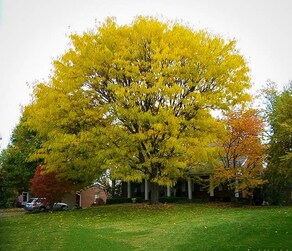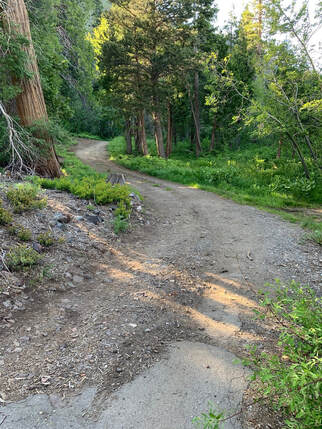 By Rev. Linda Taylor One gift of collegial conversation is the new learnings that arise when we share anexperience. Recently, I told a long-time colleague about a phenomenon I’ve noticed in my spiritual direction practice. For years I've noticed that It’s not unusual for several people to bring the same issue to direction within a week, or even on the same day. The stories are different, but the issues share a common thread. Almost always, I notice how the thread is playing out in my own life, which frequently leads me to discussion with my own spiritual director. I asked my colleague if she has ever had the same experience. She acknowledged she too noticed this synchronicity. Our curiosity led us to explore what might be happening. I’ve been reading about particle entanglement, so I wondered if this experience is another manifestation of the universal connection we share. My colleague wondered if the thread is something so present to us at a subconscious level that we’re actually tuning out something that our directees want or need to talk about. Our practice of spiritual direction shines a light on our own lives as well as those of the peoples whose lives we are privileged to hear. Our self-supervision during and following each session—as well as in sessions with our supervisors—can help focus that light in a way that supports the life-long formation we are called to embrace. I think I’ll be continuing to wonder about the emergence of these threads and to be grateful for the unknowing that just might lead to deeper awareness about what’s happening in my practice and my life. Having written about my own experience, I'm wondering what might be happening in you at this moment. When have you noticed synchronicity in your own work or life? What thread keeps popping up along your path? What invitation or insight may be unfolding in you? If you would like someone to listen with you, feel free to reach out to any of our spiritual directors here at CCSV.  By Brooke Maffia Wang I strap on the smelly hard hat equipped with headlamp standing along the creek in the crevice of the rolling hills littered with sheep and cattle in Waitomo, New Zealand. Memorized by the unique charm of the stalagmite and stalactite that entice us to wander slowly into the cave allowing 20 minutes for our eyes to adjust to the dark. Eventually, in the pitch darkness of the cave,the 12 person sardine filled raft of chatty tourists pushes away toward the glowing blue.“Scuba”, our guide bangs the side of the raft with the paddle to make the worms think food is coming. Silence falls quickly over us as we watch the tiny blue lights brighten as if on a dimmer switch. We float toward the “living lights,” as the Māori people call them. In the darkness, you can feel jaws drop and breath seem to stop in a collective sense of awe in the presence of this unique beauty. We float slowly and reverently as if we were in a cathedral. I think of the Thomas Merton quote I had serendipitously read that morning: At the center of our being is a point of nothingness which is untouched by sin and by illusion, a point of pure truth, a point or spark which belongs entirely to God, which is never at our disposal, from which God disposes of our lives, which is inaccessible to the fantasies of our own mind or the brutalities of our own will. This little point of nothingness and of absolute poverty is the pure glory of God in us.… It is like a pure diamond, blazing with the invisible light of heaven. It is in everybody, and if we could see it we would see these billions of points of light coming together in the face and blaze of a sun that would make all the darkness and cruelty of life vanish completely. Thomas Merton, Conjectures of a Guilty Bystander (Garden City, NY: Doubleday, 1965, 1966), 140, 142. Tiny, two inch worms, living in hammock type webs create this phenomenon. The glow attracts food in order to sustain itself for its short 2 month long life, most of which is spent in the larva stage. The more food they have the brighter they are. This experience felt dripping with metaphor, but for today I want to simply offer this: We all have a “living light” within us. A spark.
Glow worms are largely unimpressive and easy to miss in natural light. Today, may you find the light and environments to help you see and follow the spark within you.  By Don Ferris When I am Among the Trees by Mary Oliver When I am among the trees, especially the willows and the honey locust, equally the beech, the oaks and the pines, they give off such hints of gladness. I would almost say that they save me, and daily. I am so distant from the hope of myself, in which I have goodness, and discernment, and never hurry through the world but walk slowly, and bow often. Around me the trees stir in their leaves and call out, "Stay awhile." The light flows from their branches. And they call again, "It's simple," they say, "and you too have come into the world to do this, to go easy, to be filled with light, and to shine." I’ve struggled most of my Christian life “to go easy”. It’s the Evangelical church world I was born into, became a Christian, and served as a minister for fifty-one years. A local church was doing a series on the Fruit of the Spirit. The irony made me pause. Each sermon declared that it is the Fruit of the Spirit, and then preached it as something to achieve, strive for, and put into action. Mary Oliver reminds me, of this amazing grace and who I am in relationship with God, my Loving Creator. I’m a branch, as Ignatius reminds us, “created of love, by love, and for love” for the blessing of the world. And, like the trees remind me, "It's simple," they say, "and you too have come into the world to do this, to go easy, to be filled with light, and to shine." The Spiritual Exercises of St. Ignatius have been a wonderful guide for me to “go easy, be filled with light, and shine.” If you long for this simple freedom and a deeper intimacy with God, I invite you to join us for The Exercises, which begin September 16th. Heart communication happens when we slow down,
when we quiet down, look, and listen. Stop to take a breath. Become fully present with the person we’re with. Listen with all of our being. At this point, communication can occur without words. Being present is a gift that fills our hearts and spirits. We are in communion. Kay Lindahl, The Sacred Art of Listening: Forty Reflections for Cultivating a Spiritual Practice Questions for deeper reflection: * Today, what pace are you moving at? * Pay attention to your body. Notice the faithful rhythm of your breath that goes with you always. Feel the rise of your chest and filling of your belly. The pause at the top. Then the sinking and constricting as you exhale. Lastly, that moment of rest before the pattern repeats without your permission. * Who or what is inviting for your attention? How do you want respond in a way that honors the request and yourself? * When is the last time you felt as if you communicated without words and it brought a communion? What was the gift for you in that space? Does that experience have anything to offer you today in your current situation?  By Jim Peterson Each step taken on Life’s journey is, already, The destination “... each step is the destination.” Someone recently shared this piece of paradoxical wisdom with me. I was struck by how this paradox shimmered for me; whenever I encounter such a paradox, I suspect the Spirit’s wisdom is lurking underneath. What is the deep truth beneath this paradox? I remember a hike I once took on the island of Iona; a small hill bordered the road I was walking and a path lead up the slope, so I decided to climb to the top – my destination. But when I arrived at the summit, an easy climb, I discovered that this first summit had hidden another, higher, one just beyond. So, I kept climbing to my new destination, only to find that this summit too hid an even higher one. And so I was led on once again. Eventually, after one or two additional summits revealed themselves, I did reach the highest point. Looking back, what was my “destination” after all? At each mini-summit I paused and gazed at the beauty of the immediate surroundings, at the distant vistas of the abbey, farm buildings, sea and sky, and at the neighboring islands. And each time I was blessed. Yes, the vista expanded with each subsequent summit, but each mini-summit had become a destination in itself. In ordinary life, to be on a journey seems to demand a particular destination, an end, a stopping place where we say, “I’ve arrived at last!” Yet the wisdom of seasoned travelers tells us that the journey itself is the point. The “goal” is to be ever open to the new that unfolds as we travel and to be changed by it. Yet the true journey is not a random sequence of places visited willy-nilly. There is an orientation of some sort -- a way of travel that guides our steps. We do not simply go through a series of places but allow the places to go through us that we might be touched, and touch those we encounter in return. In a faith perspective, Love is this orientation, I believe. In life, we journey to give and receive Love, to be in compassionate relationships, in connection with all we encounter on our journey — persons, creatures, situations and circumstances, indeed all of creation. To travel in Love also implies the accompaniment of an “other,” One who dwells in us as we dwell in them. We do not travel alone, and we have a guide. The Celtic “peregrines” were known to wander until they found their “place of resurrection” – and then they stayed. But this need not necessarily be a physical place (though for many, like Columba on the island of Iona, it was). It is more fully an orientation to Love, to letting go of living under the command of a self-oriented and self-protecting ego. So, each step taken under the guidance of that orientation to Love is indeed a destination, the destination! |
Archives
April 2024
|